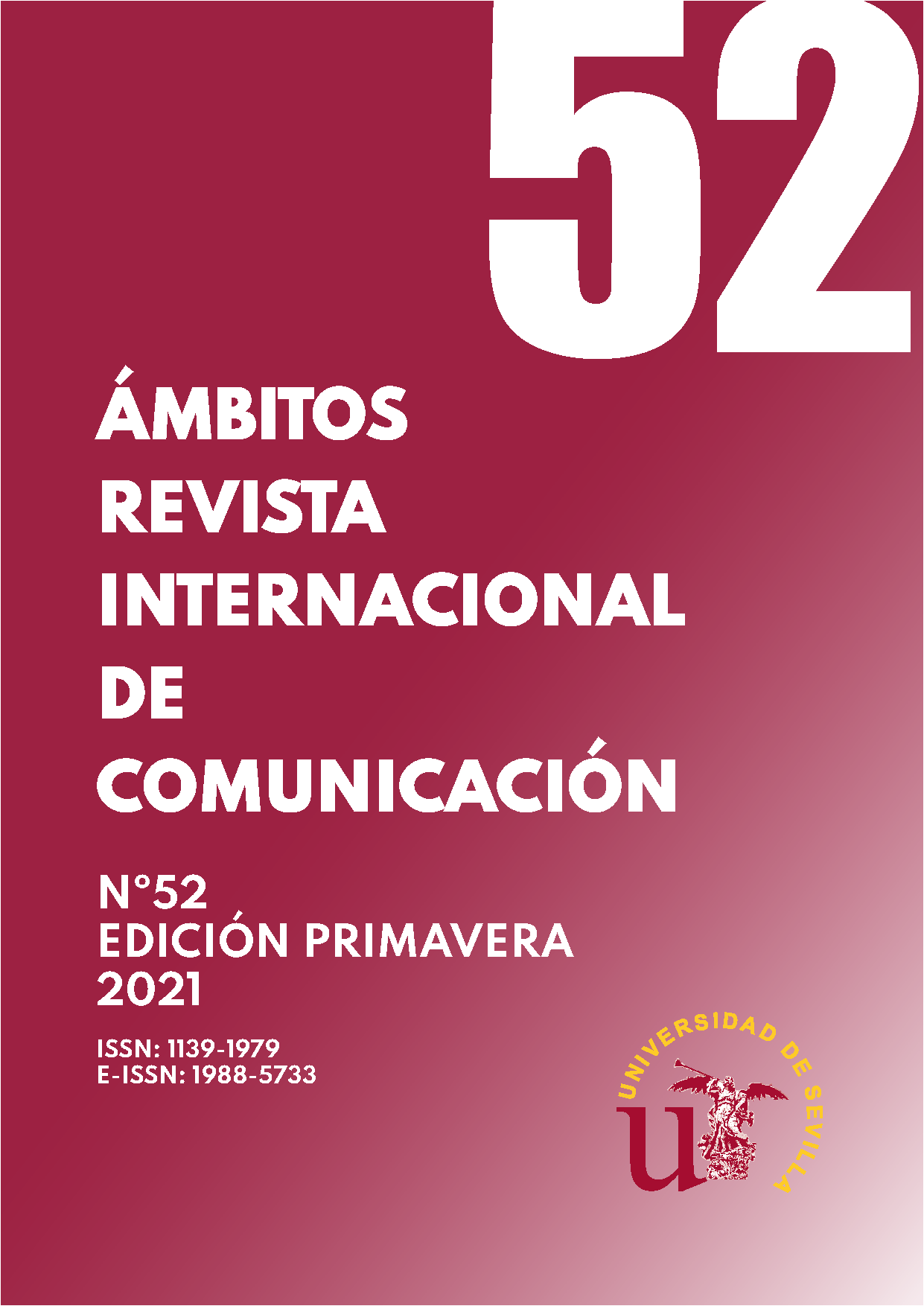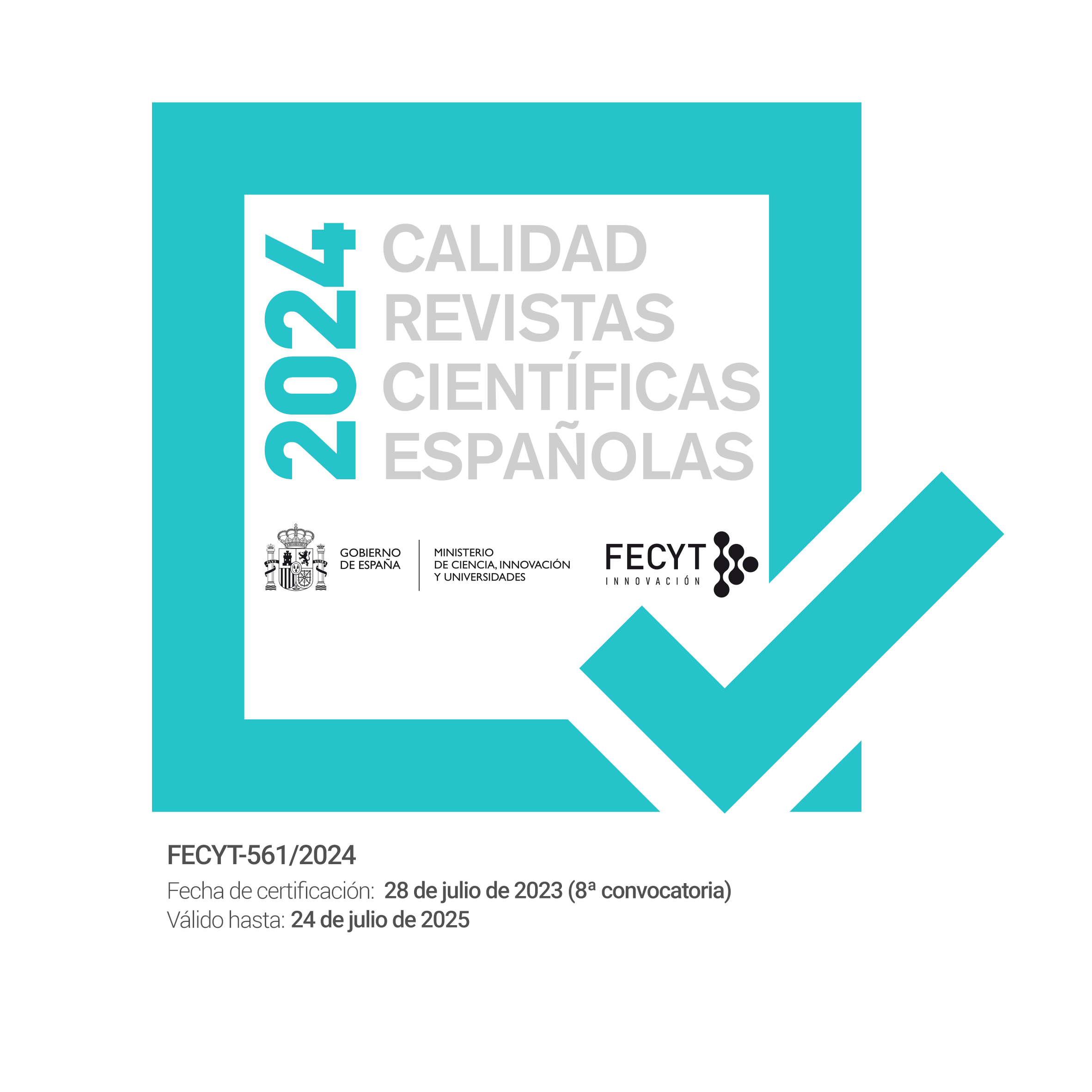University and pandemic: communication in distance education and pandemic: communication in distance education
DOI:
https://doi.org/10.12795/Ambitos.2021.i52.10Keywords:
Educommunication, Higher Education, Interpersonal Communication, Educational Innovation, COVID-19Abstract
The alarm state caused by COVID-19 hastily invaded our lives with not only political, economic or sanitary implications but with educational ones too. Education had to adapt itself to a new scenario where the ICTs assumed the leading role. Faculty and students had to adapt to distance education in an improvised way which neither of them were ready for, with subjects which were designed for a face-to-face education and not for an exclusively virtual education. This investigation intends to know the adaption of the Spanish universities to this new scenario, paying special attention to the communication between the faculty and students as the key for an effective education (Aliste 2007). An exploratory research with a structured survey is proposed as the methodological tool that is aimed to the Spanish educational campus community. Results show difficulties on the part of professors and students when facing the virtual learning and, at the same time, this results warn of the needs of the online education which are pre-sent in teaching plans to guarantee the effectiveness of the teaching-learning process. Faculty and learners point out the impoverishment of the didactic and social communication in online education developed during the state of alarm. The most used and best valued tools are the videoconference and the email.
Downloads
References
Aliste, C. (2007). Modelo de comunicación para la enseñanza a distancia. Análisis experimental de una plataforma de e-learning [Tesis doctoral, Universidad Autónoma de Barcelona]. https://bit.ly/3qMrc5M
Cabero, J. (2009). Los nuevos escenarios y las nuevas modalidades de formación: Las aportaciones desde las nuevas y antiguas tecnologías. En J. Tejada y otros (Coord.), IV Congreso de formación para el trabajo (pp. 187-207). Tornapunta Ediciones.
Chamizo, R. y Fernández, M.J. (2013). Del aula al espacio virtual: Nuevas fórmulas para el aprendizaje cooperativo. En J. Díaz-Cuesta (Coord.), Estrategias innovadoras para la docencia dialógica y virtual (pp.257-279). Visión Libros.
Del Valle, M.A. (2019). El manejo de la inteligencia emocional en las aulas virtuales y su impacto socio educacional: el camino de entornos urbanos inteligentes hacia entornos urbanos emocionales. En Actas Icono14: VII Congreso Internacional Ciudades Creativas (pp. 502-517). Asociación de Comunicación y Nuevas Tecnologías.
Durán, R.A. (2016). La Educación Virtual Universitaria como medio para mejorar las competencias genéricas y los aprendizajes a través de buenas prácticas docentes [Tesis doctoral, Universidad Politécnica de Cataluña]. https://bit.ly/3tmBf2W
Echeverría, B. (2002). Gestión de la Competencia de Acción Profesional. Universidad de Barcelona.
Esquivel, A.S. y Canto, P.J. (2018). Tipos de interacciones en un ambiente virtual de aprendiza-je entre estudiantes, profesores y contenidos. Revista Valera, 18(51), 263-277. https://bit.ly/38EqEbV
Fariza, N., Razak, N.A. & Aziz, J. (2010). E-learning: analysis of online discussion forums in promoting knowledge construction through collaborative learning. Wseas Transactions on Communications, 9(1), 53-62. https://bit.ly/30FT9Bt
Forsyth, H., Pizzica, J., Laxton, R., & Mahony, M. J. (2010). Distance education in an era of elearning: Challenges and opportunities for a campus-focused institution. Higher Education Research and Development, 29(1), 15-28. https://doi:10.1080/07294360903421350
Galvis, A. H., y Pedraza, L. d. (2013). Desafíos del e-learning y del blearning en educación superior. En N. Arboleda Toro y T. Rama Vitale (Ed.), La educación superior a distancia y virtual en Colombia: nuevas realidades (113-154). ACESAD.
García, L. (2011). Perspectivas teóricas de la educación a distancia y virtual. Revista Española de Pedagogía, 249, 255-271. https://bit.ly/3qI2J1j
García-Valcárcel, A. y Tejedor, F. J. (2017). Percepción de los estudiantes sobre el valor de las TIC en sus estrategias de aprendizaje y su relación con el rendimiento. Educación XX1, 20(2), 137-159, https://doi:0.5944/educXX1.19035
Gutiérrez, G.F. y Borja, Y.A. (2016). Elearning. Una visión de las publicaciones en revistas de alto impacto. Revista Publicando, 3(8), 162-169. https://bit.ly/30HWikn
Hernández-Sánchez, Alba, M., y Ortega, J. A. (2015). Aprendizaje Electrónico Afectivo: un modelo Innovador para Desarrollar una Acción Tutorial Virtual de Naturaleza Inclusiva. Formación Universitaria, 8(2), 19-26, https//doi:10.4067/S0718-50062015000200004
Hodges, Ch., Moore, S., Lockee, B., Trust, T. & Bond, A. (2020). The Difference Between Emergency Remote Teaching and Online Learning. Educause Review. https://bit.ly/30F90Am
Jones, Ch. & Shao, B. (2011). The net generation and digital natives: implications for higher education. Higher Education Academy. https://bit.ly/3bNSsg5
Joo, Y. J., Lim, K. Y. & Kim, E. K. (2011). On line university students’ satisfaction and persistence: Examining perceived level of presence, usefulness and ease of use as predictors in a structural model. Computers & Education, 57(2), 1654-1664.
http://dx.doi.org/10.1016/j.compedu.2011.02.008.
Lapadat, J. C. (2002). Written Interaction: A Key Component in Online Learning. Journal of Computer-Mediated Communication, 7(4), https://doi.org/10.1111/j.1083-6101.2002.tb00158.x
Lorenzo, M.M., Ferraces, M.J., Pérez, C. y Naval, C. (2019). El profesorado universitario ante el aprendizaje-servicio: variables explicativas. Revista de Educación, 386, 37-61, https://doi:10.4438/1988-592X-RE-2019-386-426
Mahle, M. (2011). Effects of interaction on student achievement and motivation in distance education. Quarterly Review of Distance Education, 12(3), 207-215. https://bit.ly/2OvZsFp
Martínez, P., Pérez, J. y Martínez, M. (2016). Las TICS y el entorno virtual para la tutoría universitaria. Educación XX1, 19(1), 287-310, https://doi:10.5944/educXX1.13942
Moore, M. G. (1991). Editorial: Distance Education Theory. The American Journal of Distance Education, 5(3), 1-6.
Moore, M. G. (1993). Theory of transactional distance. En D. Keegan (Ed.), Theoretical principles of distance education, (22-29). Routledge.
Moreira, J.A., Reis-Monteiro, A. y Machado, A. (2017). La educación superior a distancia y el e-Learning en las prisiones en Portugal. Comunicar, 25(51), 39-49. https://doi.org/10.3916/C51-2017-04
Núñez, A. A. (2020). La educación en línea y el rol de la motivación. Revista Transdigital, 1(1). https://bit.ly/3bLvA0q
Palvia, Sh., Aeron, P., Gupta, P., Mahapatra, D., Parida, R., Rosner, R. & Sindhi, S. (2018). Online Education: Worldwide Status, Challenges, Trends and Implications. Journal of Global Information Technology Management, 21(4), 233-241, https://doi:10.1080/1097198X.2018.1542262
Raya, E. y Gómez, M. (2018). Estudio comparativo sobre metodologías de enseñanza y aprendizaje en tres universidades británicas. En E. Domínguez Romero, J. Bobkina y M.L. Pertegal Felices (Coords), Alfabetización digital e informacional (pp. 409-426). Gedisa.
Sagastume, F., Morales, M., Amado, H. y Hernández, R. (2018). La importancia del tutor en los cursos virtuales: experiencia, buenas prácticas y recomendaciones. En Proceedings of the Digital World Learning Conference (pp. 91-97). Recuperado de https://bit.ly/30Fxf1v
Sanz, C. y Zangara, A. (2012). La escritura colaborativa como una e-actividad. En Actas del XVIII Congreso Argentino de la Ciencia de la Computación (580-588). Instituto de Investigación en Informática LIDI.
Usoro, A. & Abid, A. (2008). Conceptualising Quality E-learning in Higher Education. E-learning, 5(1), 75-88, http://dx.doi.org/10.2304/elea.2008.5.1.75
Vercher-Ferrándiz, M. L. (2019). La gestión de la inteligencia emocional como competencia distintiva en la docencia online para la mejora de la gestión del proceso enseñanza-aprendizaje en el ámbito de las ciencias sociales [Tesis doctoral. Universitat Politècnica de València]. https://bit.ly/3rNw3F8
Vilanova, G.E. (2016). Modelos de interacción en ambientes virtuales de aprendizaje en la Educación Superior. Sistemas, Cibernética e Informática, 13(1), 77-83. https://bit.ly/3rOnE4n
Viloria, H.A. y Hamburger, J. (2019). Uso de las herramientas comunicativas en los entornos virtuales de aprendizaje. Chasqui. Revista Latinoamericana de Comunicación, 140, 367-384. https://bit.ly/2OQCxVh
Downloads
Published
How to Cite
Issue
Section
License
Ámbitos. Revista Internacional de Comunicación is an open access journal, which means that all content is freely available at no charge to the user or their institution. Users may read, download, copy, distribute, distribute, print, search or link to the full text of articles, or use them for any other lawful purpose, without seeking prior permission from the publisher or author. This definition of open access is in accordance with the Budapest Open Access Initiative (BOAI).

Unless otherwise noted, all content in the electronic edition is distributed under a "Creative Commons Attribution-NonCommercial-ShareAlike 4.0 International License". You can consult the informative version and legal text of the licence here. This should be expressly stated in this way where necessary.
In case of acceptance of the manuscript, the authors cede the rights of the work for its publication to Ámbitos. Revista Internacional de Comunicación under the Attribution-NonCommercial-ShareAlike 4.0 International license contract (CC BY-NC-SA 4.0). The authors retain copyright and third parties are authorised to copy, distribute and make use of the work, provided they comply with the terms and conditions set out in the licence
- Cite the authorship and the original source of publication (journal, publisher and URL of the work).
- Do not use them for commercial purposes.
- If you remix, transform or create from the material, you must release your contributions under the same license as the original.
More information can be found at https://creativecommons.org/licenses/by-nc-sa/4.0/deed.es


















